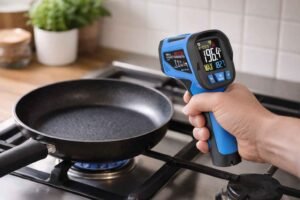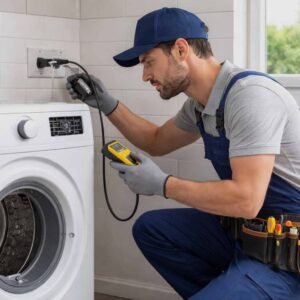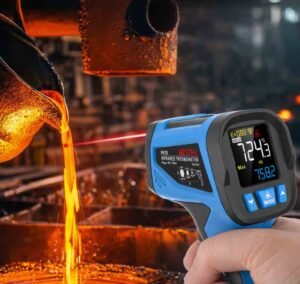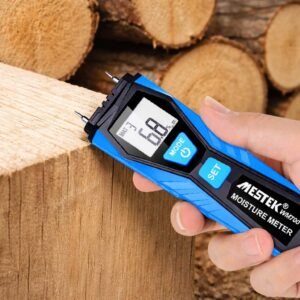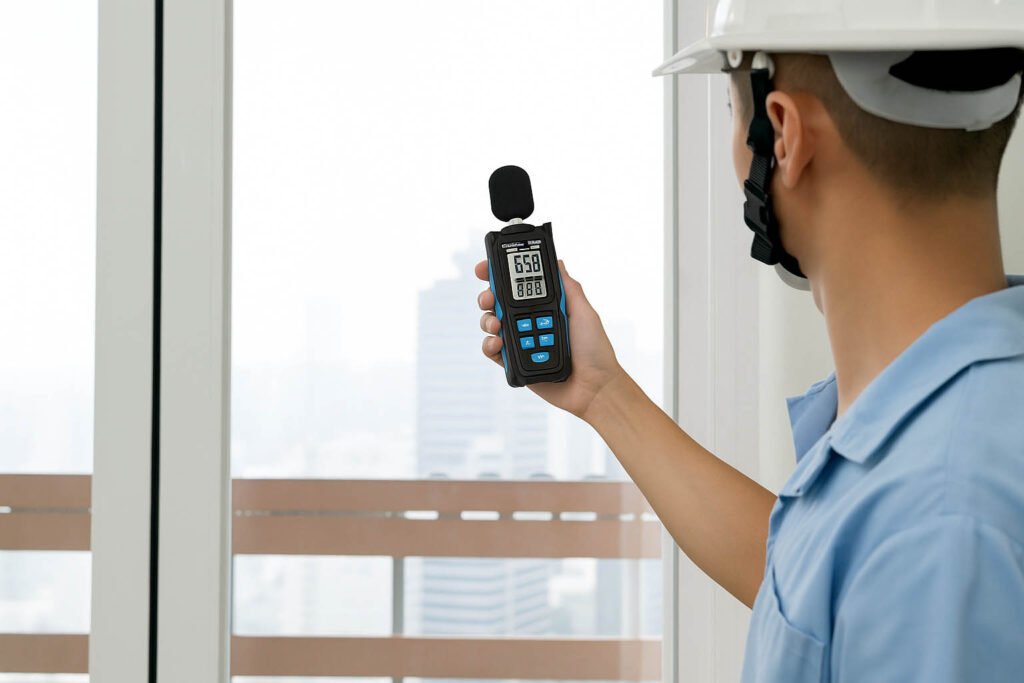
Noise is everywhere — from bustling city streets to busy factories and even home studios. Prolonged exposure to high sound levels can impact health, safety, and productivity. That’s why choosing the proper decibel meter is essential.
A decibel meter is the correct tool to easily indicate the level of noise, whether an environment is too noisy to bear, too loud to work, or too noisy for professional sound level calibration. It does not matter whether you are monitoring industrial equipment, dealing with event noise, or testing the acoustics of your home office; the correct device will make a difference.
This guide will help you understand what to look for when choosing the best decibel meter for personal, commercial, or industrial use.
What a Decibel Meter Actually Does
A sound level meter or a decibel meter is a device that functions similarly to a thermometer, but for sound. It is a measure of the loudness or quietness of the environment in decibels. The device contains a small microphone that picks up sound waves, which are then processed quickly by an internal processor. The findings are then shown on the screen, providing you with an immediate and precise read of the surrounding noise level.
Who uses these? Safety managers check if factories protect workers’ ears properly. City planners measure traffic noise. HVAC technicians test air conditioning systems. Even regular people buy them to deal with noisy neighbours.
Key Features That Actually Matter
Before purchasing a decibel meter, it’s essential to understand which features truly impact performance. The following key aspects will help you make an informed decision.
Accuracy and Standards
Not all decibel meters measure sound in the same manner. Some are very accurate, whereas others are approximations. The difference comes down to standards—typically marked as Class 1 or Class 2. Before purchasing a decibel meter, it’s essential to understand which features truly impact performance. The following key aspects will help you make an informed decision.
Class 1 meters are super precise. Scientists use them when accuracy really counts. Class 2 meters are what most people need. They’re accurate enough for workplace checks and professional use. Plus, they cost less. Both types follow international rules called IEC 61672. Unless you’re doing lab research, Class 2 works perfectly for proper noise measurement.
Measurement Range
Every decibel meter measures within a specific range. Most good ones go from 30 dB to 130 dB. That’s quiet library whispers up to jet engine levels. Consider what you are measuring. Office noise is usually 50-70 dB. Factory floors hit 85-100 dB. On construction sites, noise levels can reach up to 110 dB.
Choose a meter at least 10 decibels higher than your estimate. Also, check the frequency range. Human ears hear from 20 Hz to 20,000 Hz. Your meter should cover this range. Most have A-weighting and C-weighting settings. A-weighting matches how our ears actually hear.
Display and Data Features
You want a screen you can read easily, so look for a clear LCD with big numbers. Some meters show real-time levels. Others remember the loudest and quietest sounds recorded. Data logging is helpful if you need records. The meter saves readings automatically.
Later, you can easily transfer the saved readings to your computer for analysis. Some modern models even connect via Bluetooth, allowing real-time monitoring through your smartphone. Battery life also plays a key role; look for a device that lasts at least eight hours to ensure uninterrupted use during long inspections.
Build Quality
Your decibel meter must be able to withstand the actual situations. Remember the following points:
- Material: Select meters of strong plastic or metal, which are more durable.
- Weather Resistance: In case you will be exercising outside, it must have an IP rating. Hint: IP54 is resistant to dust and water splashes.
- Microphone Protection: The microphone is vulnerable–some meters have a removable cap to provide an added measure of protection.
- Portability: Consider the weight and grip, especially when you plan to carry the meter or use it for an extended period.
Different Types for Different Needs
Basic Models for Simple Tasks
You should check the noise at home. Basic decibel meters work perfectly for this. They’re simple: turn on, point at the sound, and read the number. These give accurate enough readings for personal use. They won’t have data logging or computer connections. But you don’t need those anyway.
Professional Models for Work
If measuring sound is part of your job, you need something better. Professional decibel meters meet Class 1 or Class 2 standards. They save noise measurements and let you download them later. Safety officers rely on these for protecting workers. HVAC technicians use them to diagnose problems. These meters cost more but give certified results that people trust.
Advanced Models for Experts
Some professionals need extra features. Advanced decibel meters break down which frequencies cause the noise. Is it a low rumble or a high-pitched whine? These advanced meters capture every detail of sound. Acoustic engineers use them to design concert halls. Researchers need them for detailed studies.
Why MESTEK Instruments Stands Out
MESTEK Instruments is a trusted name in the measurement industry, backed by over 15 years of experience and an unwavering commitment to quality and innovation. We design professional tools that are accessible to all — from solo technicians to industrial service teams.
When it comes to noise measurement, MESTEK offers a range of sound level meters designed for different needs:
- SL720 Sound Level Meter: Compact, lightweight, and ideal for everyday sound checks.
- SL720B Digital Decibel Meter: It is characterised by a colour LCD, A/C weighting, and accurate 30-130 dB readings.
- SL750 Professional Sound Level Meter: Provides great precision in monitoring workplace, industrial, and environmental noise.
MESTEK goes beyond decibel meters, offering a full range of reliable measurement tools, including thermal imaging cameras, digital multimeters, clamp meters, and environmental testers. Their products make measurements easy, fast, and accurate for both professionals and individual users.
Mistakes to Avoid
- Avoid choosing the cheapest decibel meter available. Inexpensive options from unknown brands often deliver unreliable readings — and when accuracy matters, you’ll end up buying twice.
- Another mistake is forgetting about calibration. Every meter needs it yearly to stay accurate. Check if the company offers calibration services.
- Some people overlook data storage. If you need to document noise over time, make sure your meter saves information.
- Consider future needs, too. You may be measuring 80 dB sounds now. But jobs change. Getting a meter with a broader range gives flexibility, but warranty and support matter. A meter is an investment. Make sure you can get help if problems arise.
FAQ
Q1: What is the difference between Class 1 and Class 2 decibel meters?
Class 1 meters provide laboratory-grade precision with tighter accuracy standards. Class 2 meters are widely used in most professional applications due to their lower cost.
Q2: How often should I calibrate my decibel meter?
Calibrate at least once per year. When you frequently use your meter or in extreme environments, it is best to calibrate it every 6 months.
Q3: Can smartphone apps replace professional decibel meters?
Smartphone apps work for casual use only. For professional work, legal compliance, or workplace safety, you need a certified meter meeting proper standards.
Q4: What measurement range do I need for workplace noise testing?
A 30-130 dB range handles most workplace situations perfectly. This includes offices with no noise and industries with no noise problems.
Q5: What is A-weighting and C-weighting on a decibel meter?
A-weighting filters sound to match human hearing sensitivity, ideal for most measurements. C-weighting measures all frequencies equally, better for deafening sounds and peak levels.
Q6: Do I need a data logging feature in my decibel meter?
If you need documentation or long-term monitoring, yes. Data logging automatically saves readings over time, letting you create reports and track noise patterns easily.
Final Thoughts
Choosing the appropriate decibel meter is as simple as knowing what you need. There is no need to get the most expensive one or the cheapest one. Pay attention to accuracy with Class 1 or Class 2 certification. Make sure it measures the range you need and has features that make your work easier.
Quality equipment gives measurements you can trust. Whether it is in the security of the workers, inspection of environmental provisions, or noise fixation, the appropriate decibel meter makes it all easier. It is all about using the correct numbers to help you make good decisions.
